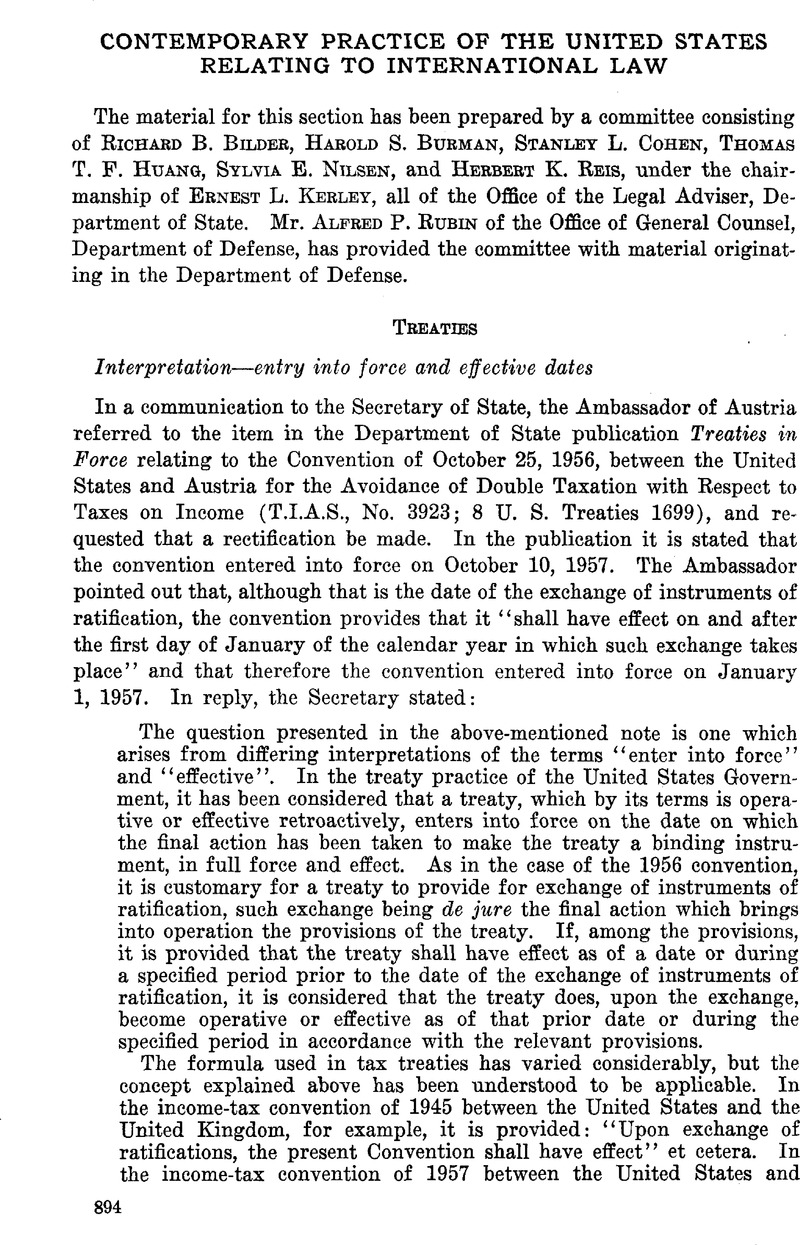No CrossRef data available.
Published online by Cambridge University Press: 28 March 2017

1 Art. 64 (1) and (2) of the International Coffee Agreement provides:
“ ( 1 ) The Agreement shall enter into force between those Governments which have deposited instruments of ratification or acceptance when Governments representing at least twenty exporting countries having at least 80 percent of total exports in the year 1961, as specified in Annex D and Governments representing at least ten importing countries having at least 80 percent of world imports in the same year, as specified in the same Annex, have deposited such instruments. The Agreement shall enter into force for any Government which subsequently deposits an instrument of ratification, acceptance or accession on the date of such deposit.” “ ( 2 ) The Agreement may enter into force provisionally. For this purpose, a notification by a signatory Government containing an undertaking to seek ratification or acceptance in accordance with its constitutional procedures as rapidly as possible, which is received by the Secretary-General of the United Nations not later than 30
December 1963, shall be regarded as equal in effect to an instrument of ratification or acceptance. It is understood that a Government which gives such a notification will provisionally apply the Agreement and be provisionally regarded as a party thereto until either it deposits its instrument of ratification or acceptance or until 31 December 1963, whichever is earlier.” (Senate Doc, Exec. H, 87th Cong., 2d Sess., at 32.)
1 E. 9584, 68 Stat. 883.
2 Sec. 1971 provides that “ For the purposes of this chapter the term 'vessel of the United States' shall mean any private vessel documented or certificated under the laws of the United States.”
3 Sec. 1974, “Inapplicability of Chapter to certain seizures,” states: “The provisions of this chapter shall not apply with respect to a seizure made by a country at war with the United States or a seizure made in accordance with the provisions of any fishery convention or treaty to which the United States is a party.”
4 Sec. 1975: “The Secretary of State shall take such action as he may deem appropriate to make and collect on claims against a foreign country for amounts expended by the United States under the provisions of this chapter because of the seizure of a United States vessel by such country.”
1 Public Law 455, 81st Cong. (H.R. 4406), 64 Stat. 12; 22 U.S.C. Ch. 21, $1621.
2 In reply to a similar inquiry concerning the taking by the Government of Yugoslavia in 1948 of property owned by persons who later acquired United States citizenship in 1956, the Department of State noted:
“The United States Government has always adhered to this principle and, accordingly, does not intervene on behalf of persons who were not citizens of the United States at the time of loss or damage, even though such persons became citizens at some later time. Also, it has been the policy of the United States Government not to permit citizens of the United States who did not have that status at the time of loss or damage to share in lump sums paid by foreign governments in settlement of nationalization or war damage claims.”
(Letter dated Jan. 29, 1963, from Assistant Secretary of State Dutton to Senator Javits.)
On the other hand, an obligation has been assumed by one state, under certain circumstances, to compensate nationals of another state who did not have nationality of the latter state at the time the alleged loss or damage occurred. Thus an Agreement between the Governments of the United States and Yugoslavia, on July 19, 1948, 62 Stat. 2658, T.I.A.S., No. 1803, settling and discharging all claims of citizens of the United States against Yugoslavia for the nationalization or other taking of their property prior to that date, provided in effect that:
“With respect to claims of persons who were not American nationals at the time aptheir property was nationalized but who had acquired American citizenship by July 19, 1948, the date of the above-mentioned agreement, Yugoslavia undertook to compensate such claimants either by direct negotiation with them or according to compensation procedures established by Yugoslav law. Such claims had to be filed with Yugoslav authorities by April 14, 1961.” authorities by April 14, 1961.“
(Letter from the Deputy Assistant Legal Adviser (Misey) to the American Consulate General at Zagreb on Jan. 23, 1963.)”
3 H.R. 7283. See 57 A.J.I.L. 354-372 (1963). The proposed legislation, as printed in the Senate on Sept. 13, 1962, contained certain amendments which were not incorporated in the final Act, which would have, inter alia, included in the definition of “nationality of claimants” those persons who had become nationals after the date on which the loss or damage occurred but on or before the date of enactment of the legislation. Of. Sec. 204 of the Act.
Another proposed amendment, which was not enacted, would have extended the categories of claimants under the nationality rule to provide for the determination of claims of those persons who were refugees from specified Eastern European countries or areas and who had suffered loss or damage to property located in such areas in the postwar period beginning May 8, 1945, and ending Jan. 1, 1952. Proposed Sec. 219, Eeport 2513 (Oct. 2, 1962), House of Representatives; see also proposed Sec. 218 a-f, ibid. The Foreign Claims Settlement Commission, acting on behalf of the Executive Branch, had opposed the amendments. (Letters on file in the Office of the Legal Adviser.)
4 Signed at Paris, Feb. 10, 1947, 61 Stat. 1915, T.I.A.S., No. 1650, 41 U.N. Treaty Series 21; 42 A.J.I.L. Supp. 179 (1948).
5 International Claims Settlement Act of 1949, op. cit., as Amended by Public Law 285, 84th Cong. (H.E. 6382), 69 Stat. 562.